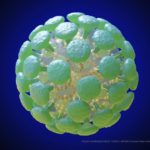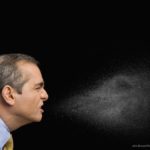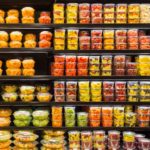The FDA warns that making home hand sanitizer can be dangerous, since people may not be able to formulate product that has the correct percentage of alcohol. It's important to note that soap and water is the gold standard for cleaning your hands in the coronavirus pandemic. It is easy to make hand sanitizer incorrectly, and it may not be effective or could be dangerous. But if you don't have access to soap and water, this formulation was developed by infection disease specialists that can substitute for commercial sanitizers in a pinch only if made correctly. Follow this recipe closely if you choose to make it. But remember, soap and water is best. Hoarding as a result of the coronavirus pandemic has people worried and upset. The items that are most often hoarded include toilet … [Read more...]
Coronavirus Pandemic Food Delivery: How You Can Protect Yourself
The coronavirus pandemic is changing the way Americans eat. Many more people eat at restaurants, take out food, or have it delivered than cook in their own kitchens. But with the news that the virus can survive on surfaces, especially plastic and cardboard, for days, is coronavirus pandemic food delivery safe? The FDA and USDA insist that the U.S. food supply is safe, and there are no cases of transmission through food or food packaging. But with new information coming out about this pathogen every day, it pays to think about things like food containers and transmission. After all, a few weeks ago experts didn't think the virus could be transmitted by touching a contaminated surface; that has changed. Viability of the virus on fomites, which are surfaces such as plastic handles … [Read more...]
Fecal-Oral Transmission of COVID-19 Is Possible, But Not Likely
A new study has found that fecal-oral transmission of COVID-19 is possible, but not likely. The research was conducted in China. It must be stressed: this type of transmission is theoretically possible, since viruses can enter the GI tract and survive in feces, but no cases of infection via this route have been identified. All cases diagnosed so far have been through inhaling droplets containing the virus. This is not a likely vehicle for transmission, but people should know about it. This new information is concerning because it brings food into the COVID-19 pandemic. The fecal-oral route of transmission means that when a person who is infected with a bacteria or virus goes to the bathroom, gets a tiny amount of feces on their fingers, and doesn't wash their hands, then touches … [Read more...]
New Information About COVID-19 Viability on Surfaces
The news is changing rapidly about COVID-19 viability on surfaces. At the beginning of this pandemic scientists thought that that coronavirus wouldn't retain viability on surfaces for very long, and also that it couldn't survive in the air. That information is probably incorrect, according to a paper published in the New England Journal of Medicine. Because we have never seen a virus like this before, scientists could only compare it to other coronaviruses such as SARS and H1N1. Now that researchers have been able to study it, and have conducted tests, they know more about it. In this paper, COVID-19 is called SARS-CoV-2. The virus was tested in ten experimental situations involving the two strains of the virus in aerosols, plastic, stainless steel, copper, and cardboard. The … [Read more...]
Is the Coronavirus Pandemic Forcing You to Cook? Learn About Food Safety
The coronavirus pandemic is changing our lives in just about every way. From stores and restaurants closing to practicing social distancing, everyone is being forced to learn new habits and new ways of living. Is the coronavirus pandemic forcing you to cook? This is a great time to learn about food safety. In 2015, for the first time, Americans started spending more of their food budget on restaurant meals than grocery stores. While some groups will always cook from scratch, many people just don't do that anymore. So it's crucial that you learn about food safety as you are just starting to cook. You don't want to get food poisoning when hospitals are overwhelmed with pandemic patients, or any other time for that matter. Home cooks are the last line of defense against food … [Read more...]
Restaurant Unpaid Sick Leave Policies Changing With Coronavirus Pandemic
The coronavirus outbreak, which has been characterized as a pandemic by the World Health Organization, has highlighted an issue in the United States. Experts are telling people to reduce social interaction with others, called social distancing, to reduce the rate of transmission. But what if your job requires you to be around people? And what if you are paid hourly and can't afford to take time off? That's an issue for many workers, especially those in the food industry. Because of this pandemic, restaurant unpaid sick leave policies are changing now. There is no federal regulation mandating paid sick leave in this country. Sick leave is set by corporations and some states. And since 1 in 4 Americans, or 32,000,000 people, have no sick leave, they are often unwilling or simply … [Read more...]
Wash Your Hands to Prevent Food Poisoning and Coronavirus
Coronavirus is the big news these days: the virus is circling the globe, infecting thousands of people and may expand to pandemic proportions. Experts are giving great advice on how to avoid the virus. So what does that have to do with a site that focuses on food poisoning? There is one thing that prevention of coronavirus and food poisoning have in common: Wash your hands! There is no vaccine to prevent a COVID-19 infection. And there are no vaccines to prevent infection from Salmonella, Campylobacter, E. coli, Listeria monocytogenes, and Staphylococcus aureus. The best advice from experts is to wash your hands thoroughly and frequently to prevent transfer of viruses and bacteria to others. So do you know how to wash your hands properly? Here's the gist: Wet your hands under … [Read more...]
Should You Stockpile Foods In Coronavirus Preparation?
The coronavirus outbreak is, of course, all over the news. This illness doesn't have much to do with food except in preparation. In most natural disaster situations, there is a run on grocery stores and hardware stores. How prepared are you? Should you stockpile foods in coronavirus preparation? Experts say that every family should have about two weeks' worth of food and water on hand because a disaster can strike anywhere and anytime. That means a variety of shelf stable, nutritious foods should be in everyone's pantry. However, hoarding and precipitating a run on grocery stores isn't good for the country as a whole. Plan ahead and don't panic. Coronavirus has caused illness in 47 countries around the world. There aren't widespread outbreaks in the U.S. yet, but still it's good … [Read more...]
FDA Addresses Issue of China Coronavirus and Imported Products
On our Facebook page recently, one person asked if anyone should be concerned about the safety of products arriving from China as the coronavirus outbreak continues. The virus has been named COVID-19, as it is a virus causing coronavirus disease that was first identified in 2019. Is there a danger regarding coronavirus and imported products? The FDA is working to surveil the medical product supply chain and is using enforcement tools to oversee the safety and quality of FDA-regulated products. The FDA isn't able to conduct inspections in China now, as the U.S. State Department's Travel Advisory is not to travel to China because of the outbreak. Here's the takeaway line: "Fortunately, currently, we are not seeing the impacts of this outbreak resulting in an increased public health … [Read more...]












